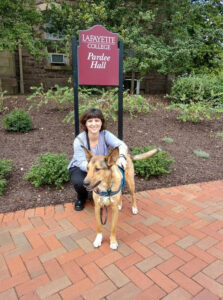Professor Bianca Falbo Discusses First-Year Seminar Courses
 FYS (First-Year Seminar) tries to introduce students to the idea that working at a big thing, a hard thing, is pleasurable and why. Coming up against a challenge, or a difficulty that you may not be able to resolve, that you may struggle with, but that’s part of academic work, and it’s part of what’s pleasurable about academic work. – Professor Bianca Falbo, English, Director of the First-Year Seminar Courses
FYS (First-Year Seminar) tries to introduce students to the idea that working at a big thing, a hard thing, is pleasurable and why. Coming up against a challenge, or a difficulty that you may not be able to resolve, that you may struggle with, but that’s part of academic work, and it’s part of what’s pleasurable about academic work. – Professor Bianca Falbo, English, Director of the First-Year Seminar Courses
Do You Feel My Pain? Money: The Root of All Evil? Let’s Go Outside. Charisma. Punk. What do all of these titles have in common? They are all names of current First-Year Seminar (FYS) courses offered this Fall at Lafayette. First-year seminars are considered high-impact educational practices, especially when they “place a strong emphasis on critical inquiry, frequent writing, information literacy, collaborative learning, and other skills that develop students’ intellectual and practical competencies.”
FYS courses are quite distinct from other offerings. As described by Dr. Falbo:
I think increasingly FYS courses are ones that you won’t see in another department, and certainly when I am working with faculty to develop a new course, I am encouraging them to not develop a course that looks like it could be a 100-level course in their department. It should really look like it’s an FYS course. So what’s an FYS course? Typically, it asks a big question which it explores from multiple perspectives–those may be academic disciplinary perspectives or something else. An FYS is writing-intensive. It’s small. It’s discussion-based. Students’ questions and responses to the reading are the things that should be leading the discussion. In terms of the CCS (Common Course of Study), an FYS is the student’s introduction to academic discourse—to the ways of reading, writing, seeing and being inside the academy. Of course in 14 weeks, an FYS can’t offer a comprehensive introduction, but it can introduce students to strategies they can take them with them to other courses and that will help with critical reading and writing.
When asked how FYS faculty contribute to teaching excellence at Lafayette, Professor Falbo indicates:
FYS classes are small seminar classes, and the idea is that the professor and the students are, in the Frierean sense, co-learners. The course is an invitation to students: Hey, here’s this interesting question that doesn’t have easy answers. Let’s look at it together. And so the professor is not the expert on the topic so much as a model for what a smart, curious person does in the face of a big, complicated question. The professor shows students what they can do when they encounter a text that is hard or new to them: here are the kinds of questions you can ask, here are some reading strategies you can apply to a text that you are not an expert on. These moves are key for academic readers and writers. In addition, new students sometimes come in focused on what they want to specialize in. The FYS course is an opportunity to see that pursuing a big question involves cross-disciplinary understandings. FYS instructors also help students develop their ability to participate in a discussion. They help students see that working at a question or problem in common with fifteen other people in the room is intellectually engaging and worthwhile work. Finding common ground through discussion builds community which is crucial for students just arriving on campus who may be a bit overwhelmed.
This semester a small group of FYS faculty are participating in the Teaching Squares Program in an effort to be more reflective about their teaching and learn from their peers.
For More Information:
First-Year Seminar Course Descriptions
High-Impact Educational Practices (Association of American Colleges & Universities)